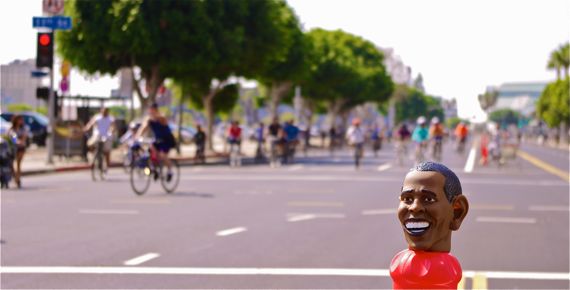The federal government might be shut down right now, but that doesn't mean that we have to stop thinking about how to spend the federal funds that will (eventually, hopefully) come our way.
The Housing and Community Investment Department (HCID) is going to be hosting six community forums throughout the city this month to discuss the Consolidated Plan, and they would really like it if you would stop by to say hello and offer your thoughts on how federal money should be spent in your community.
"Hell, yes!" you're surely thinking. Because who doesn't want money spent in their community, right?
Yet, you remain slightly confused, wondering, "Hark, what is this Consolidated Plan you speak of?"
Great question.
With the ascension of team Garcetti to the reins, city planning has seen some shuffling of the cards, er, departments. The Community Development Department (CDD) was dissolved and reconstituted in the form of the HCID. Its mandate, according to the website, is "the development of citywide housing policy and supporting safe and livable neighborhoods through the promotion, development and preservation of decent and affordable housing." Within that category also fall a variety of family services and youth programs.
The Consolidated Plan is the city's strategic plan to utilize "the annual allocations of Community Development Block Grant (CDBG), Emergency Solutions Grant (ESG), HOME Investment Partnerships Program (HOME), and Housing Opportunities for Persons with AIDS (HOPWA) grants to develop viable urban communities" in line with the HCID mandate. They work to do that by using the funds to provide viable housing and living environments and to expand economic opportunities, especially for lower income residents.
The city's 2013 - 2017 Plan is the first such plan that is specifically transit-oriented. It seemed fitting that, given the unprecedented level of investment in transit of recent years, funds directed toward housing and generating economic opportunities be integrated or leveraged with those directed towards transit to maximize the benefits to communities. And while the city does have the plan guidelines established through 2017, federal funds are disbursed yearly. Therefore, priorities need to be revisited on a yearly basis.
Which makes your input important.
Take the issues developing along the Crenshaw Line, for example. As soon as the Leimert Station was announced, the word on the street was that rents were immediately raised, both for businesses and for residents.
Meanwhile, some of the business owners I interviewed about their economic aspirations for the area were saying, "Business? What business? There is no business here!" referring to the decline of the business environment and the struggle many owners have had in just keeping their doors open and their businesses afloat. None of which is helped by the fact that the construction of the line itself may bring fewer jobs to the area than anticipated.
Similarly, although the Plan notes (p. 4) that 44% of all Metro stations have Affordable Housing Trust Fund (AHTF) projects located within a half mile and almost 80% of AHTF properties are within a half mile of a Rapid Bus Transit line, folks in Boyle Heights reported housing costs going up when the Gold Line came through (and some bus services were being cut). And people are somewhat uneasy about what's in store for them in Watts, where changes are slated for the 103rd St. station and Jordan Downs is going to be redeveloped altogether.
Finding some way to ensure people's ability to remain in their neighborhoods once transit-oriented improvements are made is important to helping those areas flourish and grow in sustainable ways.
I can't guarantee that showing up at a meeting and having your say will automatically translate to the outcomes you hope for, but asking that federal funds be prioritized to assist and protect the people and businesses already committed to their communities certainly can't hurt.
Here's where you can go to learn more about what the city is thinking about doing with the funds, what kinds of funds are available, and to have your voice heard:
EAST LA
Boyle Heights City Hall
2130 E 1st St, Los Angeles, CA 90033
Tuesday, Oct. 8, 2013
6:30 pm to 8:00 pm
VALLEY
Pacoima Neighborhood City Hall
13520 Van Nuys Blvd., Pacoima CA 91331
Wednesday, Oct. 9, 2013
6:00 pm to 8:00 pm
SOUTH LA
Constituent Service Center
8475 S. Vermont Ave., Los Angeles, CA 90044
Thursday, Oct. 10, 2013
6:00 pm to 7:30 pm
CENTRAL LA
Red Shield
1532 West 11th St., Los Angeles, CA 90015
Tuesday, Oct. 15, 2013
6:00 pm to 8:00 pm
HARBOR AREA
Wilmington Senior Center
1371 Eubank Ave., Wilmington, CA 90744
Wednesday, Oct. 16, 2013
6:00 pm to 8:00 pm
WATTS
Bradley Milken FamilySource Center
1773 E. Century Blvd., Los Angeles, CA 90002
Thursday, Oct. 17, 2013
6:00 pm to 8:00 pm






